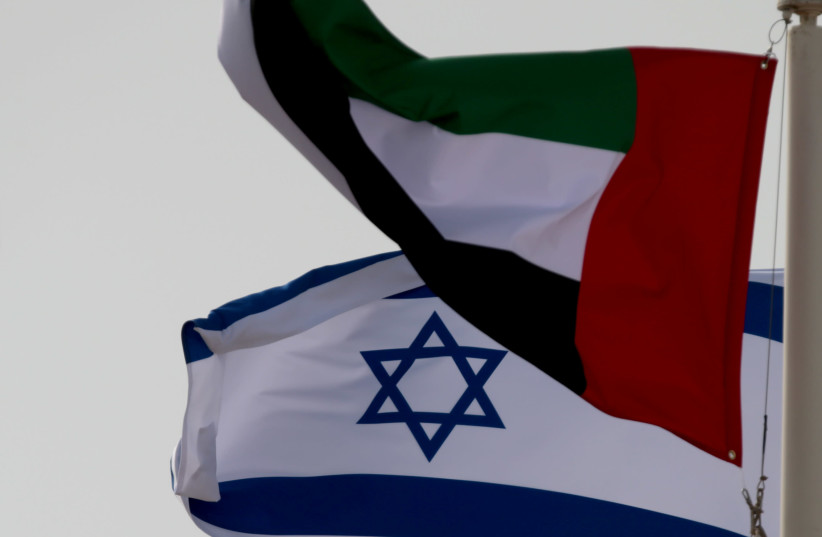Decision to delay controversial pipeline project over environmental concerns unlikely to lead to major crisis, however.
By MAYA MARGIT/THE MEDIA LINE JULY 27, 2021

Israel’s decision to freeze a proposed oil pipeline deal with the United Arab Emirates marks the first real test of the Abraham Accords that normalized Israel-UAE relations but is unlikely to lead to a lasting diplomatic crisis, say political analysts in the region.
Israel’s Environmental Protection Ministry on Sunday announced it would be delaying the launch of a controversial oil transport deal with the UAE that has riled environmentalists. The deal would see oil from the Persian Gulf brought to a terminal in the southern Israeli port city of Eilat; from there the oil would continue its journey via an aging overland pipeline that runs all the way to Ashkelon on the Mediterranean Sea coast. Finally, ships would carry the black gold to European markets.
The deal involves Israel’s state-owned Europe Asia Pipeline Co. (EAPC) and UAE-based MED-RED Land Bridge.
Hundreds of environmental scientists repeatedly have warned that such a move could lead to devastating ecological consequences for Eilat, which is home to world-renowned coral reefs and marine wildlife.
On Sunday, the Environmental Protection Ministry told the EAPC it would be “delaying the evaluation of preparations to increase activity in the Eilat port until the government has a discussion and reaches a decision” on the project.
According to Professor Yoram Meital, a historian of the modern Middle East and director of Ben-Gurion University’s Chaim Herzog Center for Middle East Studies and Diplomacy, the announcement is the first real test for the Abraham Accords.
“It is serious because we have a deal that is now frozen by one side, the Israeli side, but at the same time I think that the Emiratis do understand that this is a new government with totally different policy lines,” Meital told The Media Line. The oil deal “was dubious when it was signed and is much more controversial today, and this is the background of the freeze,” he said.
At the time of the signing of the Abraham Accords, the rhetoric mainly focused on fostering an economic peace between Israel and several Arab states. One of the primary goals of normalization was to take the region in a totally new direction based on mutually beneficial economic interests.
Despite the fact that the proposed oil deal concerns hundreds of millions or, potentially, even billions of dollars, Meital nevertheless does not believe it will result in a lasting diplomatic spat.
It’s too early to say if it will lead to serious tension or a crisis, but I don’t think so. No one would like to risk the peace treaty itself,” he asserted.
Dr. Yonatan Freeman, an international relations expert at the Hebrew University of Jerusalem, told The Media Line that the decision is more of an indication of a shift in internal Israeli politics, rather than a change in diplomatic policy.“
It remains to be seen whether or not it will be a permanent freeze,” Freeman said. “We’re conveying to the officials in the UAE that we have a new government, we have a new Minister of Environmental Affairs and we have new policies.“
In the end, both parties see great benefit from such an agreement and right now it’s more about internal politics rather than an actual change in policy,” he said.
Likewise, Dr. Nimrod Goren, president and founder of Mitvim, the Israeli Institute for Regional Foreign Policies, said that Israel’s new government is committed to the Abraham Accords.“
The government wants to deepen this relationship,” Goren told The Media Line. “The government is evaluating the way that [former Israeli Prime Minister Binyamin] Netanyahu handled ties and wants to fix whatever it finds needs amendment. The way that UAE relations will be handled under this new government will not be identical to the way that Netanyahu did.”Importantly, he noted, the oil deal in question was signed in Abu Dhabi roughly a month after Israel and the UAE normalized ties and, as such, the peace treaty was not reliant on it.“
These are agreements that were reached by other actors after the Abraham Accords were signed,” Goren stressed.Ultimately, Goren believes Prime Minister Naftali Bennett’s government will attempt to shift the focus away from the controversial oil transport deal and instead focus on alternative paths forward for economic cooperation in the energy sector.
